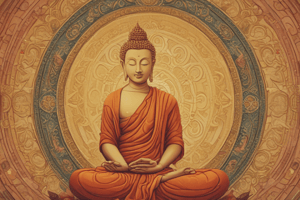Podcast
Questions and Answers
What is the primary focus of the Buddha's search for wisdom?
What is the primary focus of the Buddha's search for wisdom?
- Finding a way to end suffering (correct)
- Developing faith and confidence
- Accumulating knowledge and understanding
- Understanding the nature of the universe
What is the main difference between intelligence and wisdom?
What is the main difference between intelligence and wisdom?
- Intelligence is the ability to ask questions, while wisdom is the ability to answer questions
- Intelligence is the ability to prioritize questions, while wisdom is the ability to answer them
- Intelligence is the ability to answer questions, while wisdom is the ability to ask questions (correct)
- Intelligence is the ability to accumulate knowledge, while wisdom is the ability to apply knowledge
What is the role of wisdom in the development of other psychological faculties?
What is the role of wisdom in the development of other psychological faculties?
- It is essential for the development of other faculties (correct)
- It is a byproduct of the development of other faculties
- It is a obstacle to the development of other faculties
- It has no role in the development of other faculties
In the context of the Noble Eightfold Path, what aspects of the path are referred to as wisdom?
In the context of the Noble Eightfold Path, what aspects of the path are referred to as wisdom?
How can wisdom be developed in Buddhism?
How can wisdom be developed in Buddhism?
What is the primary objective of the Buddha's inquiry into wisdom?
What is the primary objective of the Buddha's inquiry into wisdom?
What is the relationship between wisdom and the other perfections in Buddhism?
What is the relationship between wisdom and the other perfections in Buddhism?
What is the significance of wisdom in the seven factors of enlightenment?
What is the significance of wisdom in the seven factors of enlightenment?
What is the role of external agencies in the development of wisdom in Buddhism?
What is the role of external agencies in the development of wisdom in Buddhism?
What is the relationship between wisdom and the spiritual faculties in Buddhism?
What is the relationship between wisdom and the spiritual faculties in Buddhism?
Flashcards are hidden until you start studying
Study Notes
• Wisdom is the fourth of the ten perfections in Buddhism, but it's hard to understand why it's listed fourth because it's a core structure that influences and characterizes all the other perfections.
• Wisdom is not the same as intelligence, and a person with high intelligence can still be unwise and lack conscience.
• Intelligence is the capacity to answer questions, whereas wisdom is knowing which questions are important to ask.
• In science, wisdom is deciding which subject to study and which question to prioritize, and for the Buddha, the most important question is the cause of suffering and how to end it.
• The Buddha's search is not about accumulating knowledge, but about finding a way to end suffering, and he believes that all suffering is ultimately unnecessary.
• In Buddhism, there is no external agency that can intervene and manifest wisdom, and wisdom can only be developed through individual effort and the internalization of good advice.
• The faculty of wisdom is essential for the development of other psychological faculties, including faith, and it's the second factor in the seven factors of enlightenment, known as investigation of Dhamma.
• Wisdom is also one of the five spiritual faculties, and it's an absolute necessity that informs all the other faculties.
• In the Noble Eightfold Path, wisdom refers to the last two elements, mindfulness and Samadhi, which conspire together to produce wisdom.
• The Buddha says that if one has established sila (morality), then Samadhi (concentration) may rise, and if one is established in Samadhi, wisdom will naturally arise.
• Right concentration (sama Samadhi) requires right view, which is an intellectual understanding of the Four Noble Truths, and wisdom fulfills right view.
• The Eightfold Path begins with wisdom (right view) and ends with wisdom, and wisdom loops back into the path, making it the core of the perfections.
• Every other perfection, including loving-kindness, generosity, patience, and determination, requires wisdom to be fully developed.
Studying That Suits You
Use AI to generate personalized quizzes and flashcards to suit your learning preferences.





